Once you figure out how to generate electricity using solar, wind, water, or some other method, you have truly achieved a milestone.
Your job is less than half done now because you still need a way to store excess power. You will also need to control and stabilize current flow so that it does not damage devices attached to the power source.
Today, most people in off-grid situations or preparing for long term survival rely on batteries. Unfortunately, there is no such thing as a perfect battery for every person, let alone one battery type that will suit every need for your bug out location.
As you learn more about these battery types, take the time to make sure you know as much as possible about your current and projected energy usages.
Will you be starting off with conventional appliances and power needs?
Are you planning to have a small farm that will eventually utilize tractors and other equipment?
How will your energy usage plans change to accommodate growing food indoors, purifying water, and dealing with weather pattern changes?
Unless you have all of these scenarios firmly in mind, it will be very hard to gauge power usage and find the best batteries for your needs.
But let’s see what the choices are, and the 6 questions to ask when choosing between common types of batteries.
Lead Acid Batteries
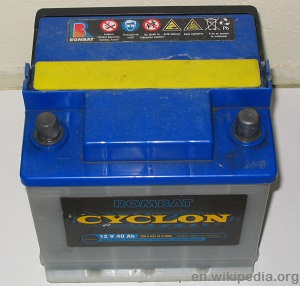
As ions are exchanged, the negative terminal (US versions) of the battery gives off electrons.
Power generating devices such as alternators, solar panels, or other devices feed electrons into the positive terminal in order to start the ion exchange all over again.
- Common uses – automobile ignition systems, RV and boating systems.
- Variations – shallow cycle batteries are used in ignition systems because they produce large amounts of power in short bursts. Deep cycle variations produce less power over a longer period of time.
- Average lifespan – shallow cycle batteries can last from 3 – 5 years of light duty. Deep cycle batteries can be charged and discharged to 45% of their capacity for 3 – 5 years or more depending on quality of the materials and thickness of the plates used.
- Can they be rebuilt or refurbished? Yes, they can.
- Advantages for off grid power storage – Lead-acid batteries are cheap and readily available. They can be hooked up in parallel or series banks and provide power for most needs.
- Disadvantages for off grid power storage – Emit hydrogen gas that can start an explosion or fire. This is especially important to consider if you try to store batteries in a closed in area or one where heat builds up quickly.
Be wary of advice on deep cycle vs shallow cycle batteries. You can do more with a mix of battery types rather than rely just on deep cycle variants. In situations where the weather is very cold, a deep cycle battery may fail when you need it most unless you spend more for ones that provide sufficient cold cranking amps.
Gel Batteries
Instead of using water to suspend electrolyte, gel batteries use a silica based gel instead.
- Common uses – They can be used in automobiles, but are most often found in marine boats and RVs.
- Variations – n/a
- Average lifespan – 500 – 6000 cycles
- Can they be rebuilt or refurbished? No, they can’t.
- Advantages for off grid power storage – Allow more current to be pulled from the battery as long as it is not in massive quantities. Gel batteries also produce less hydrogen and are less prone to spilling if the case is damaged.
- Disadvantages for off grid power storage – Overcharging or adding too much power at one time can cause the batteries to fail. Gel batteries also do not perform well in cold weather.
AGM (Absorbed Glass Mat) Batteries
Instead of using gel or water to hold electrolytes in place, AGM batteries use glass mats that allow electrons to move from one plate in the battery to the opposite one.
- Common uses – marine boats and motorcycles.
- Variations – n/a
- Average lifespan – 3 – 8 years.
- Can they be rebuilt or refurbished? They will require desulfating. Some methods may work better than others. A great deal depends on the damage to the internals of the battery and how many times it has been over charged or drained to deeply.
- Advantages for off grid power storage – They require very little maintenance while in use. AGM batteries also have a lower risk of exploding. You can also cycle them as deeply as 70 – 85% if the battery is good quality.
- Disadvantages for off grid power storage – They are more expensive than other battery types and harder to recondition.
Lithium Ion Batteries
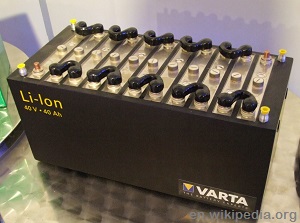
While there are large scale versions available for RV and marine use, they are still very expensive.
- Common uses – powering electronic devices
- Average lifespan – 1 to 10 years
- Can they be rebuilt or refurbished? No, they can’t.
- Advantages for off grid power storage – Lithium Ion batteries weigh less and take up less space than wet or gel batteries. They can also produce sharp, fast peaks in current as well as lower and slower supplies.
- Disadvantages for off grid power storage – These batteries are very expensive. In addition, they do not do well when over charged, or excessively deep cycled. Lithium Ion batteries also require a complex management system that to prevent them from being damaged. At the current time, there are no management systems on the market for off grid applications. If you decide to use Lithium Ion batteries for this purpose, you will need to design your own management and monitoring systems.
NiCd Batteries
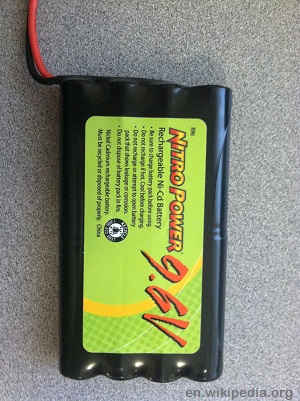
They differ from other batteries in terms of their ability to deliver a steady charge even if the are almost out of power.
- Common uses – electronic devices, cordless power tools.
- Variations – wet and dry versions.
- Average lifespan – up to 2000 cycles.
- Can they be rebuilt or refurbished? No, they can’t.
- Advantages for off grid power storage – They can be recharged very quickly and are known for supplying a very steady level of current. They are also more tolerant of cold weather than other batteries.
- Disadvantages for off grid power storage – They are very expensive, will be ruined if they are not charged up and used on a regular basis. Excessive deep cycling can ruin them. NiCd batteries also have a low tolerance for erratic charging; which makes them somewhat unsuitable for solar and other renewable fuel applications. You will need a battery management solution that smooths out the current flow before it enters the battery. It should be noted that NiMH batteries are similar to the NiCds in the sense that they also require a special power management system.
Edison Batteries
Edison Batteries use nickel and iron plus an electrolyte to store electricity. They are considered “wet cells” since the electrolyte is in the liquid form as opposed to gel or solid.
- Common uses – forklifts, mining, and other applications where heavy amounts of voltage must be drawn for long periods of time. They also tend to be favored by off gridders despite many problems.
- Variations n/a
- Average lifespan – 10 years to over 30 years.
- Can they be rebuilt or refurbished? No, they can’t.
- Advantages for off grid power storage – temperature resistant, can store and discharge large amounts of current as long as it is done slowly. They are also environmentally safer than other batteries because they do not contain lead or other heavy metals.
- Disadvantages for off grid power storage – They can be damaged by rapid charging, very large and heavy, do not respond well to massive and sudden power drains.
Are There Mechanical Alternatives to Batteries?
Even though I have been tinkering with energy systems for several years, I have yet to find a battery or battery spec that suits all my requirements.
This, in turn, often makes me wonder if there are better, and untapped way to store power using purely mechanical (as opposed to chemical) means. For example, ropes twisting around each other on an axis with a central gear might be used to store and release power generated by a wind turbine.
While converting between mechanical power and electricity has its share of challenges, perhaps thinking outside the battery box will yield some interesting results.
It can be said that modern off gridders are living with a false sense of security because they do not truly know how long their power storage batteries will remain functional. As you can see, some batteries have an expected lifespan of five years, while the most durable ones may not last an entire human life span.
Once society collapses, equipment used to make these batteries may no longer be available. As technology and skilled people become lost, rest assured that what works early on may not work later on.
If you truly want to avoid a second crisis after an initial social collapse, take the time now learn what you can about power storage off the grid.
Now is also a good time to think seriously about power storage methods that do not rely on chemicals.
This article has been written by Carmela Tyrell for Survivopedia.
Further reading:
http://www.otherpower.com/otherpower_battery_compare.html
http://africanenergy.com/new/wp-content/uploads/2012/08/GEL-technical_manual.pdf
http://www.homepower.com/articles/solar-electricity/equipment-products/lithium-ion-batteries-grid-systems/page/0/0


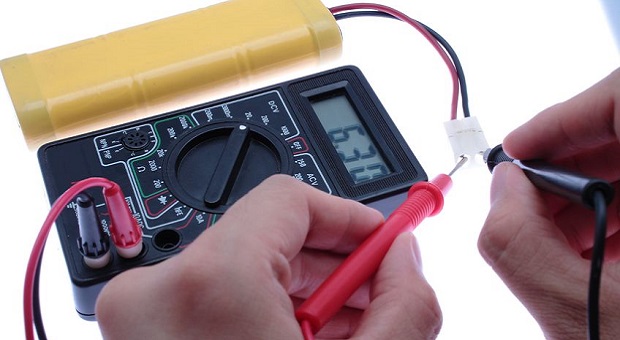
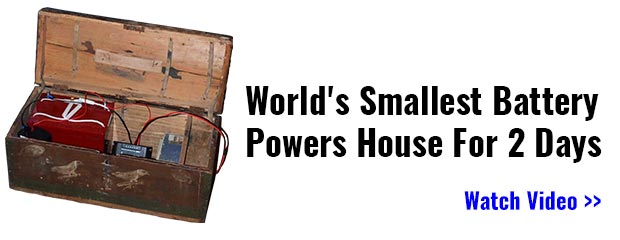

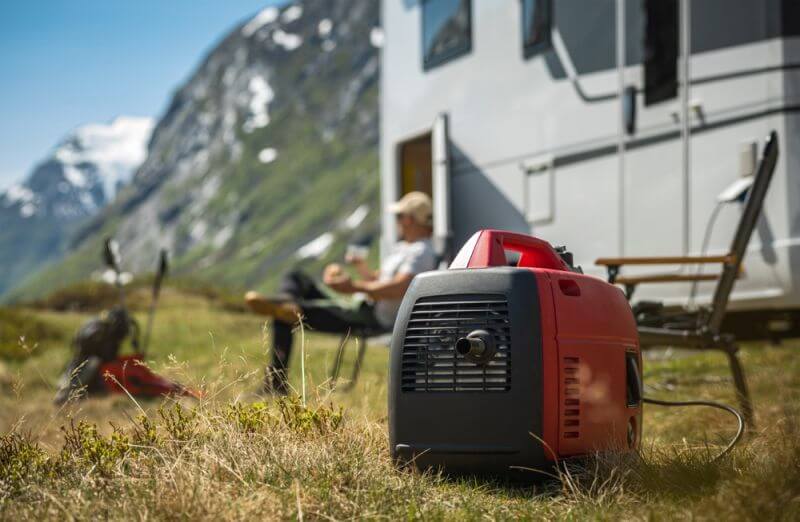

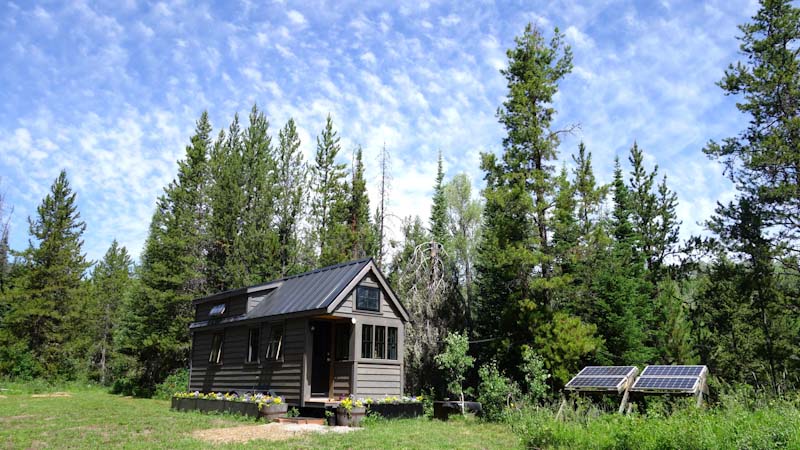

sam | March 27, 2015
|
Why no mention of NiMH batteries?
carmela Tyrrell | March 27, 2015
|
Sam – I mentioned them with the NiCd’s since they have some elements in common.
I quote:
It should be noted that NiMH batteries are similar to the NiCds in the sense that they also require a special power management system.
Scott Todd | April 4, 2015
|
They don’t have a lot of the shortcomings of NiCd such as “memory” and can pack more power into an equivalent space.
Samuel Skousen | March 27, 2015
|
One mechanical solution used in the 80’s that I worked on was a flywheel system. Power it up with an energy source the using air bearings or a Halbach array they can hold energy for a long time. The problems include parasitic losses in “charging” and “discharging”. Typically used to filter energy spikes or temporary small energy loss. They require explosion proof cages in case of flywheel disintegration at speed. More work on these is required but the potential for off grid storage is tremendous.
carmela Tyrrell | March 27, 2015
|
Hmm… interesting. I don’t know of this system, but was thinking about a toy I used to play with as a child. It was just two pieces of yarn and a cardboard disk. The yarn goes through two holes in the center of the disk. Next, you spin the yarn to twist, and then pull outward, then let the yarn “wind” again by letting your hand move closer to the disk. That thing could get going pretty fast.
My other thought is large sized capacitors and those good old joule thieves again. 😀
Scott Todd | April 4, 2015
|
Capacitors would only be good for providing short bursts of energy such as for starting a motor.
Rob fletcher | March 27, 2015
|
I have absolutely NO knowledge in electrical systems or electronics. I am wondering about putting together a backup storage system using deep cycle batteries using solar/wind to generate. Can I use the 6, 6volt batteries that are in my electric golf cart in this kind of system with normal off the shelf inverter, voltage regulator equipment?
carmela Tyrrell | March 27, 2015
|
Rob – the problem with golf cart (and other deep cycle batteries) is they won’t last long even if you use the proper inverters and protection systems. Consult the manufacturer of the batteries for safety precautions, and then take it from there.
My personal recomendation remains to keep some shallow cycle batteries on hand and look for low power drain devices.
Rob fletcher | March 28, 2015
|
I appreciate the advice.
But I will use these batteries first.
And I still need to know if these 6, 6 volt batteries connected in series can be used just like 12 volt batteries with typical inverters and voltage regulators.
Great Grey | March 29, 2015
|
Yes using two batteries to make higher voltage is fine they just need to be same type and capacity. It is how they make 24 and 48 volt systems.
cATHERINE mCcOY | March 27, 2015
|
Can someone tell us how to refurbish a battery?
carmela Tyrrell | March 27, 2015
|
Catherine,
It depends on the battery type. You can refurbish car starter batteries, but not most of the others listed in this article. I have seen a few videos that claim it is possible to refurbish “maintenance free” batteries. I have not tried those methods, nor do I believe they work because some of the details about how to open and test the battery are not accurate for gel batteries. For example, there is one video I found that used a standard battery tester (the one that looks like a turkey baster) in a gel battery….
John E Harper | March 27, 2015
|
Please continue to send me updates.
Farmer | March 27, 2015
|
Living off grid is quite similar to living on a yacht (which I did for 10 years) …. There is a wealth of information and resources available from the boating community on how to survive on DC. After all … 500 miles at sea is no place to run out of juice – so, many lessons have been learned over the years. Check out some of the yachting websites for some valuable information and leads to top notch equipment.
carmela Tyrrell | March 28, 2015
|
Yes – I agree – there are many valuable lessons to be learned from boating; especially how and where to get low drain appliances. That being said – there is a point where you simply have to generate and store large quantities of electricity on land for things like farming and as society recovers – factories and other installations that require lots of power.
Rambuff | March 27, 2015
|
Carmela,
I am sorry – but there are MANY statements you made in this article that I HOPE you made in ignorance….because they are bullshit – in particular your affirmations about the Nickel-Iron “Edison” batteries.
Now, I am sorry – I do not know your professional background, but I AM AN ELECTRICAL ENGINEER – although I have only 40 years in that occupation, in 4 major disciplines. You probably exceed that….but let’s get started:
1. They are popular ….”Despite many problems”??? LIKE WHAT, exactly?? Like they CAN, with proper maintenance LAST NEARLY FOREVER??? You made the statement that their lifespan is “10 to over 30 years”….Did you know that there is an Edison Battery in the Smithsonian that has been cycling for OVER 100 years??????
2. “They cannot be Re-built or Re-furbished”…ABSOLUTE BULLSHIT!!! There is a company in Montana, Zappworx, that has been doing just that for over 5 years that I know of.
3. You said they are easily “Damaged by rapid charging” – also BS. WHAT are your references for this affirmation? In addition – in the two instances I have seen in a malfunction of a charge controller with an Edison Battery, the regulator was damaged, but the battery was JUST FINE. A bit of the electrolyte had to be replaced (re-filled), but the plates were fine.
4. “Don’t respond well to massive and sudden power drains” …..well, WHAT BATTERY IN ALL CREATION DOES????? Now for the fact – I have NEVER seen a battery that recovers as well as a nickel-iron battery after having terminals shorted, or having circuit failure downstream cause a massive power drain. I have had MANY other battery systems overheat, meltdown and even explode cells in that instance….the NI batts hiccup, then go right back online. You may have to clean up carbonization, but they CAN survive.
5. “The most durable ones (batteries) may not last an entire human life span” …another BS statement – what do we as humans make NOW that lasts our entire lifetime? But may I again refer you to my example #1 – the batt in the Smithsonian….over 100 years. I rest my case on that one alone.
6. “Rest assured that what works early on may not work later on”…… I don’t think I’ve heard a more BS statement, EVER. “Rest assured”?????? Are you a Prophet, madam? You can read the future? You speak with conjecture about something no human possibly can!!!! “May not work later on” …..Ya think???
I will finish my tirade with this…. The only problems this ELECTRICAL ENGINEER has experienced with “Edison” batteries is first – the expense. They are VERY expensive….but not if the actual life of the battery is considered, along with its rugged ability to withstand what all other batteries cannot. Second – they are large, heavy and bulky….you wouldn’t want to use them in a small, lightweight application. Lastly, they are hard to find… and the Chinese models are NOT true “Edison” batteries… they don’t use actual nickel plates….they are something else, PLATED with nickel, that subsequently corrodes and fails.
Carmela, my lady, please stick to subjects you know about….you’ve been interesting in OTHER postings….just please try to avoid co-intel-pro articles about subjects in which you are obviously NOT well-versed.
Farmer | March 27, 2015
|
A little more respect please – this is a learning forum not a hissy fit.
carmela Tyrrell | March 27, 2015
|
Rambuff,
To start – the more I learn about Edison batteries the less I like them and the more I am inclined to look for something other than batteries to store power and even out currents. But then again – I feel the same way about other batteries that I have actually used in various solar power systems.
I place my comments in relation to your text, which I quote through this response.
I do not know your professional background, but I AM AN ELECTRICAL ENGINEER – although I have only 40 years in that occupation, in 4 major disciplines. You probably exceed that….but let’s get started:
As I have stated in my response to you on the article I did on Edison batteries – I am essentially a 20 year hobbyist developer in the arena of solar/wind/magnetic power development and storage. Like many people on this forum, I do not have engineering degrees, nor do I expect readers to be able to do certain things without professional training. Basically – if I can do it, then I figure others can as well; and so make my recommendations from that perspective.
1. They are popular ….”Despite many problems”??? LIKE WHAT, exactly??
Actually – you named two problems – they are heavy and expensive. Also – they take a long time to charge up because you can’t put a lot of current through them, and they do not hold their charge well. Over the years I’ve seen more than one forklift operator go completely bonkers because these batteries died out in the middle of a job or they had to wait for hours on end to recharge it.
Did you know that there is an Edison Battery in the Smithsonian that has been cycling for OVER 100 years??????
May I ask where that information is on the Smitsonian website?
2. “They cannot be Re-built or Re-furbished”…ABSOLUTE BULLSHIT!!! There is a company in Montana, Zappworx, that has been doing just that for over 5 years that I know of.
I took a look at the Zappworx website (and a few other places) and don’t see much about rebuilding these batteries. By “rebuilding” I don’t mean the simple process of adding electrolyte and topping the batteries off – which anyone should be able to do. By rebuildng I mean the metal plates – something that most people cannot do on a relatively small car battery.
3. You said they are easily “Damaged by rapid charging” – also BS. WHAT are your references for this affirmation?
Hearing several forklift operators speak an amazing dialect of French when the battery drained out during a job.
In addition – in the two instances I have seen in a malfunction of a charge controller with an Edison Battery, the regulator was damaged, but the battery was JUST FINE. A bit of the electrolyte had to be replaced (re-filled), but the plates were fine.
The last time I saw an Edison battery which needed the ‘lytes refilled, it overheated beforehand. I walked away that day grateful the bloody battery didn’t explode!
You might recognize what needs to be done to restore these batteries – and that is nice for you. But what about the average person that may NOT know what to do, lets the situation progress to a point where the battery explodes, or can’t successfully create a viable Potassium Hydroxide mix in the field?
4. “Don’t respond well to massive and sudden power drains” …..well, WHAT BATTERY IN ALL CREATION DOES?????
Lead acid batteries respond better than Edisons.
I have had MANY other battery systems overheat, meltdown and even explode cells in that instance….the NI batts hiccup, then go right back online. You may have to clean up carbonization, but they CAN survive.
One thing I can agree with you on is issues do come up in systems! As for the Edison being more inclined to survive – you may have seen that – I haven’t.
5. “The most durable ones (batteries) may not last an entire human life span” …another BS statement – what do we as humans make NOW that lasts our entire lifetime?
Heh – we make lots of things that last a lifetime and beyond – houses, lamps, guns (good ones), artwork, knives, etc.
6. “May not work later on” …..Ya think???
In terms of being able to maintain any of these batteries – yes – they work now – but may not be maintainable later on. I am no prophet, but I DO know the odds are against most people being able to build any of these batteries from the ground up. And, together with that, as careful as people may be – accidents and other problems can and will come up that will prevent batteries that work now from working later on. What may be relatively easy to fix, send for repair, or replace now – may not be possible in the post crisis world. If you have ever had a computer part suddenly fail, and no money to fix it (or any other device fail combined with some other constraint) – then you should be able to relate to what I am saying.
Scott Todd | April 4, 2015
|
One other minor error in the article:
Power generating devices such as alternators, solar panels, or other devices feed electrons into the positive terminal in order to start the ion exchange all over again.
Actually they supply electrons to the negative terminal and draw them off the positive. A discharged battery lacks them at the – and what should be + has been depleted by them during use.
papawpauL | March 27, 2015
|
I have been experimenting with (4) 12 volt dc motors lifting a weight by it’s 4 corners, powered by a 100 watt solar panel. When the source ceases, the weight spins the motors in reverse, turning the motors into generators. ( 12 volts after dark). So far, I can get no more than about 5 percent efficiency, but better motors, a better gear train, and a more efficient support system would probably increase that 5 fold. I see a lot of loss during the transition from solar power to generator power. I am not an EE, but this seems like a good bet for non battery energy storage. I would like to see others try this and post their findings.
papawpauL | March 27, 2015
|
In north central PA, there is a power company that uses excess generated power during low demand to run pumps that push water to a reservoir on top of a nearby mountain. The water is released to increase output during peak demand periods. Power leveling at it’s best.
Greg Shafer | March 28, 2015
|
I must say, this was certainly an interesting read. I will say my experience is limited to a variety of jobs over the years. Like most kids I was always intrigued by electrify both ac/dc from trains to slot cars, electrical systems in cars, to wiring houses. Nothing more frustrating then to pickup a flashlight, and the batteries be dead, and the same with the mower, or my car. For 3 years I worked at a forklift repair company, the first time I saw them weld a steel battery case by simply arcing the terminals, I thought they were crazy, I kept waiting for one of them to go Boom. I then worked as a parts manager at a marina, this is when I learned about converter and inverter systems. As for electrical systems, the correct battery with the correct system, works best, depending on the charging supply, and the load discharge. I must hand it to the lady for daring to go where most people won’t, and willing to share her experiences with everyday people, on a subject with many variations. As for the EE, pure showboat, and he normally would charge most people for his two cents worth of information, but he got his jollies by being rude, crude, and uncouth, as my history teacher use to say……….LOL
Rambuff | March 29, 2015
|
Okay – the gloves are off, Lady.
The fact that you have not seen something does NOT mean it does not exist, nor that it does not have efficacy.
You cast dispersion on my statement about the Edison battery in the Smithsonian….again, the fact you have not seen it does NOT mean it is non-existent. Your lack of experience should not be the only means of repudiation. I did not say anything about it being “online”, nor on their website. My experience there was from an actual visit to the hall of Science and Technology, wherein I spent over an hour discussing (with the curator) what it was, what it did, tolerances, etc. This is what I meant by your speaking authoritatively WITHOUT ACTUAL EXPERIENCE!!
Also – a truly adequate researcher or AUTHORITY on a given subject would have CALLED the folks at Zappworx, asking about their programs, projects and products, rather than just a website “quick-scan”. For over 5 years (that I know of) they sought out, purchased and yes, refurbished and re-built the fork lift batteries I must assume are your only experience with, concerning Nickel-Iron batteries. And yes, those same fork lift batts can and are abused to the point of “death”. But I have to ask….were these “original” Edison batteries made in the US, or the horrible re-creations made in China (and other 3rd-world countries)? There really IS a difference, as I noted.
I apologise for sounding off so angrily in my first response….but you made some absolutely stupid (intentional ignorance), baseless comments that you represented as FACT, when I KNOW for FACT (through experience) are just plain WRONG!
I agree, for instance, that MOST “modern” batteries cannot be rebuilt or refurbished, nor, in the specific cases of Gel and Lithium batts, even attempted. But you are wrong, wrong, wrong that the Nickel Iron cannot be. Just because you have never attempted it (or perhaps successfully so) does NOT mean it cannot be done, NOR the technology learned by the “common” person. In my experience, most Preppers or Survivalists are a tremendously skillful and adept lot, learning at times even very sophisticated techniques that can foil the most experienced technician.
I also agree that it is a good idea to at least PREPARE and learn how to use the plethora of lead-acid batteries (to create a power system) that will be in ready supply after an EMP or CME takes out the “grid” and most autos.
I still maintain though, and disagree with you on this – that the Nickel-Iron battery is the toughest, most resilient battery out there for possible use for over a lifetime. All it really takes is an eye to maintain the proper level of electrolyte (potassium nitrate solution) that is not caustic, poisonous, harmful to the environment, etc.
I also suggest you call the Smithsonian, and ASK about that battery I mentioned….it DOES exist, and is the ONLY battery I have ever heard of that has lasted anywhere NEAR that length of time. And I am NOT, by the way, intimating that I know everything about batteries in general, nor even the Edison battery, specifically.
Again, I apologise for caustic content of my first post….I have a very difficult time remaining calm when reading material by an amateur who seems to be posing as an expert, spouting FALSE statements of “fact”. And yours, again, concerning the Edison battery, were NOT complete, accurate or factual.
techtrade8 | March 29, 2015
|
My off grid solar wind hybrid system feeds a large battery bank made up of 8-6 volt golf cart batteries. The batteries are hooked up in series for the voltage, and parallel for the amps. The batteries are 5years old, and so far the system works flawlessly. I equalise the batteries periodically, and add distilled water, as needed. I also monitor the voltage continuously, while the system is in use. To date, I’ve never pulled them below 50 percent. I do use a dump load for the wind turbines when voltage gets excessive, like on a very windy sunny day. We have switched many lights in the house to LED, which makes a huge difference on drawing down the batteries. I also have 3 inverters, using whichever one fits the demand of what we are pulling from the system. My newest addition is a steam engine, powering a PM motor, which will enable me to charge the battery bank when there is no sun or wind. Having problems now getting a big enough boiler to drive the steam engine. As with any system, periodic maintenance, monitoring, care and understanding go a long way toward having a system that will work for you.
Great Grey | March 30, 2015
|
Of course you can just make a system that works only when sun shines or the wind blows. A water pump that run when the sun shines is usually able to pump all the water you need. and a solar water heater only works when the sun shines so again you only need the pump to work in daylight. While it is nice to have electricity 24 hours a day it is not absolutely necessary in most cases.
Also I would be very wary of any system that discharges lead based batteries more than 25% and would prefer to keep to only 10% or less as the batteries will last longer, even the deep discharge types life spans are hurt by deep discharge. And it gives you an emergency reserve, yes it means more/larger batteries. I know of one system that got 11 years out of batteries that are normally expected to last 5 years. All I know is that in some setups batteries seem to last a long time and others kill them.
Great Grey | March 30, 2015
|
The short life can be from over discharging, undercharging or both.
ron | April 7, 2015
|
Carmela, I appreciate the way you present your information, in a very easy to read
and understand format.
Pingback:Using Auto Batteries For Off Grid Energy Storage | Survival skills, survival guns, survival guide | April 9, 2015
|
Pingback:Using Auto Batteries For Off Grid Energy Storage | The Prepper Dome | April 13, 2015
|
Pingback:10 Things To Know About Tesla Batteries | Survival skills, survival guns, survival guide | July 23, 2015
|
Pingback:How Do You Choose Your Batteries? 6 Questions To Ask | July 25, 2015
|
Pingback:Top 5 Emergency Survival Radios | Survival skills, survival guns, survival guide | August 28, 2015
|
Pingback:Top 5 Emergency Survival Radiosdisasterdefense.usdisasterdefense.us | disasterdefense.us | August 28, 2015
|
Pingback:Top 5 Emergency Survival Radios | August 30, 2015
|
Pingback:The Prepper’s Countdown Checklist to New Year’s Eve | Prepper's Survival Homestead | December 1, 2015
|
Pingback:The Prepper’s Countdown Checklist to New Year’s Evedisasterdefense.us | disasterdefense.us | December 1, 2015
|
Pingback:12 Ways To Protect Your Heat Sources From Freezing | Survivopedia | February 11, 2016
|
Pingback:12 Ways To Protect Your Heat Sources From Freezing | NewZSentinel | February 11, 2016
|
Pingback:12 Ways To Protect Your Heat Sources From Freezing | | disasterdefense.us | February 12, 2016
|
Pingback:How To Start Building A Flashlight From Scrap | Prepper's Survival Homestead | April 15, 2016
|
Pingback:How To Choose The Best Batteries For Prepper Solar Systems | Survivopedia | November 3, 2016
|
Pingback:How To Start Building A Flashlight From Scrap | Survivopedia | July 2, 2018
|
Is CBD marijuana? | June 18, 2021
|
Good Morning everyone ! can anyone recommend where I can buy Lemon Lime CBD Oil By Core CBD?